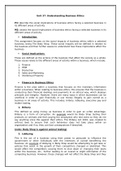Unit 37: Understanding Business Ethics
P3: describe the social implications of business ethics facing a selected business in
its different areas of activity
M2: assess the social implications of business ethics facing a selected business in its
different areas of activity
Introduction
This assignment focuses on the social impacts of business ethics within a selected
business, being The Body Shop. These social impacts will be defined in relation to
the business and then further assess to understand how these implications affect the
business.
Social Implications
These are defined as the actions of the business that affect the society as a whole.
These issues relate to the different areas of activity within a business, which include;
1. Finance
2. HRM
3. Production
4. Sales and Marketing
5. intellectual Property
Finance in Business Ethics
Finance is the area within a business that focuses on the monetary information
within a business. When relating to business ethics, this ensures that the business is
conducting their financial dealings and payments in an ethical way, which displays
principle and integrity. However, there are many ways in which businesses can be
unethical in order to gain financially or use money illegally to gain overall as a
business in all areas of activity. This includes; bribery, lobbying, executive pay and
insider trading.
1. Bribery
This defined as using money as business in order to gain an unfair advantage.
Bribery is a form of corruption. An example would be Body Shop testing their
products on animals and then paying the employees who test extra so they do not
say anything since this against their ethics. The Bribery Act 2010, was created to
enforce laws to ensure that such behaviour does not take place within an
organization and if so, they can face consequences if breached.
(note: Body Shop is against animal testing)
2. Lobbying
This is the act of a business using their power to persuade to influence the
government or other individuals with the intentions of overall benefitting the
business. An example of lobbying in Body Shop would be attempting to get laws or
policies that assist in the growth of their competitors changed or abolished. This
would affect the competitors causing them to shut down or changing their plans
within the business, etc., further leading to an overall or slight elimination of the
competing business. However, these changes will not affect the Body Shop and they
, will gain because they no longer have to worry about competition and they can
continue to grow as a business. Transparency of Lobbying, Non-Party Campaigning
and Trade Union Administration Act 2014 was created to ensure that lobbying was
not use inappropriately or illegally.
3. Executive Pay
This is the excessive payment to top executives within an organization. This can
include perks and incentives. An example of this in Body Shop would be the Chief
Financial Officer (CFO) receiving wages or salaries that they have not worked for or
receiving perk for do nothing in the organization. There are laws put in place to
ensure that this does not take place such as the Employment Rights Act 1996. Also,
businesses are required
4. Insider Trading
This is defined as the use of illegal information on the stock exchange in order to
gain as a business financially. An example of this in Body Shop would be an
executive sharing private information about the business to a friend who has shares
in the business. The friend is aware that this can affect the business and eventually
impact his shares. He therefore, sells all his shares before the information is made
public. The Criminal Justice Act 1993, prevents such activities from taking place and
the person can face consequences if this law is breached.
Ethics in Human Resource Management
Human Resources Management is the area within a business that focuses on the
controlling and maintenance of the human resources that a business has. These are
referred to as the people who help the business on a daily basis to ensure that the
tasks are completed and the overall goals are achieved. In relation to business
ethics, this is ensuring that the business treats the employees and other members of
the business fair and with honor.
There are many laws that protect the human being who work within Body Shop. This
includes;
Health and Safety at Work Act 1974
Employment Right Act 1996
National Minimum Wage Act 1998
Equality Act 2010
Disability Discrimination Act 1995
The Body Shop can have employees working in conditions that are not safe and
comfortable causing health problems to the worker. They may also be paying
workers less than what they worked for or male workers are getting paid more than
female workers, or a person of Caucasian getting paid more than an African (Black)
person. Lastly, they could not have implement precautions for workers with
disabilities. All of the above are reasons why the laws above and other are created.
To ensure that employees are treated fairly by the business and they get what they
deserve. The Body Shop should follow these laws to ensure that they are not
breaching because they can face many consequences because of the ill-treatment of
their employees.
Surveillance is the use of cameras to video the activity that takes place within the
workplace. This is a good way to occupy employees and ensure that they are doing
their job. It can also be used as proof if items are stolen from the store by employees





